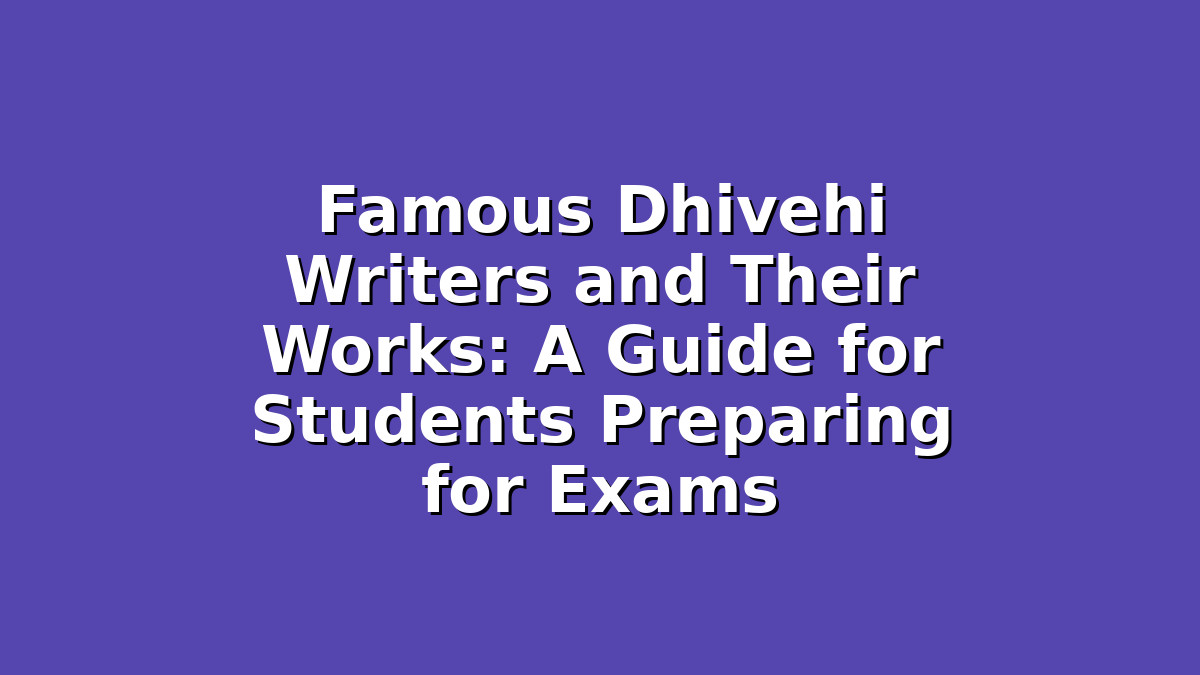For students preparing for exams, especially those studying literature or language subjects, understanding the rich heritage of Dhivehi writers can be both inspiring and beneficial. The Maldives, with its unique culture and history, has produced several notable writers whose works not only reflect the country’s traditions but also offer deep insights into human nature, society, and language. Familiarizing yourself with these writers and their contributions can enhance your comprehension skills, provide valuable context for essay writing, and boost your confidence during exams.
In this article, we will explore some of the most famous Dhivehi writers and their important works. Along the way, you’ll find study tips tailored to help you retain information, analyze texts effectively, and approach your exams with a strategic mindset.
1. Introducing Key Dhivehi Writers and How to Approach Their Works
When diving into literature, the first step is to recognize writers who have shaped Dhivehi literary culture. Some of the most celebrated names include:
– Mohamed Amin Didi: Often regarded as a pioneer in modern Maldivian literature, Amin Didi’s works blend political themes with cultural reflections.
– Hussain Shaheed Ahmed: Known for his poems and essays that highlight social issues, his writing style is both accessible and thought-provoking.
– Ameena Fairooz: A prominent female voice in Dhivehi literature, her stories often explore themes of identity, gender, and tradition.
– Maha Alim: A contemporary writer focusing on poetry and short stories that reflect daily life in the Maldives.
Study Tip: When reading a writer’s work for the first time, try to summarize each paragraph or section in your own words. This method helps you grasp the main ideas and improves recall. Create flashcards with key themes, characters, or vocabulary from the texts to quiz yourself regularly.
2. Understanding Themes and Literary Devices in Dhivehi Works
Dhivehi literature is rich in themes such as tradition versus modernity, community life, spirituality, and nature. For example, Amin Didi often explored the clash between modern political ideas and traditional Maldivian values, while Ameena Fairooz’s stories may delve into personal struggles against societal expectations.
Familiarity with literary devices such as metaphor, symbolism, and allegory is crucial. Hussain Shaheed Ahmed’s poetry frequently uses nature imagery to symbolize freedom and resilience. Recognizing these devices not only deepens your appreciation but also prepares you for analytical essay questions.
Study Tip: Keep a dedicated notebook for literary devices you encounter in your readings. Write down the device, the passage where it appears, and what effect it creates. Practice explaining these in your own words to a friend or study group—teaching others is a powerful way to reinforce your knowledge.
3. Applying Dhivehi Literature Knowledge in Exam Preparation
In exams, you might face questions that ask you to analyze a poem, compare two authors, or write an essay about a particular theme. Here are strategies to make your preparation effective:
– Create Mind Maps: For each writer, map out their main themes, notable works, writing style, and historical context. This visual aid makes recall faster and clearer during exams.
– Practice Past Papers: Look for previous exam questions about Dhivehi literature. Practicing answers helps you get used to the format and time constraints.
– Develop Thesis Statements: When writing essays, start with a clear thesis that answers the question directly. Support your points with quotes from the texts and explain how they relate.
– Time Management: Allocate time to planning, writing, and reviewing your answers. A well-structured response can earn you extra marks even if you don’t know every detail.
Study Tip: Form study groups where each member takes one writer or work to research and then teaches it to the group. This collaborative approach not only divides the workload but also exposes you to different perspectives and insights.
Conclusion
Exploring the works of famous Dhivehi writers offers students a valuable window into the Maldives’ cultural and literary heritage. By learning about key authors like Mohamed Amin Didi, Hussain Shaheed Ahmed, Ameena Fairooz, and Maha Alim, you not only prepare yourself for exam questions but also cultivate a deeper appreciation for your own language and identity.
Remember to approach your studies actively—summarize texts, note literary devices, create mind maps, and engage with peers. These strategies will enhance your understanding and retention, making exam preparation less stressful and more rewarding. Keep a positive mindset, and take pride in discovering the stories that have shaped Dhivehi literature.
Good luck with your studies!

Responses